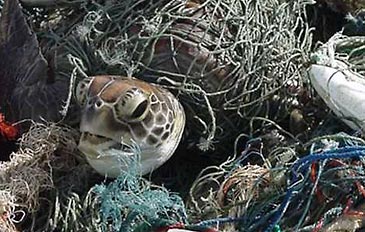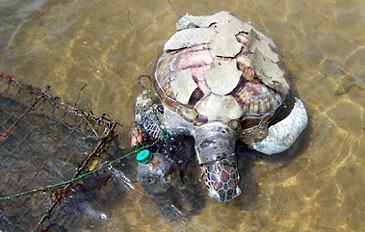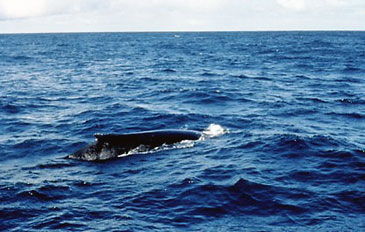|
Federal Minister for the Environment and Heritage, Dr David Kemp, today boosted protection for Australia's marine wildlife by invoking the powers of the Environment Protection and Biodiversity Conservation (EPBC) Act 1999 to combat the effects of harmful marine debris.
Harmful marine debris that injures or kills threatened marine vertebrates through entanglement or ingestion is now recognised as a Key Threatening Process based on the recommendation of the Commonwealth's Threatened Species Scientific Committee. The Minister has also commissioned a national Threat Abatement Plan.
"Plastic bags, abandoned fishing gear
and solid waste illegally dumped by
ships at sea can end up causing painful
injuries and death to dozens of marine
species including several endangered
species," Dr Kemp said.
Turtle caught by float
Photo: Lance Ferris,
Australian Seabird Rescue
"The listing of marine debris as a Key Threatening Process will mean a national Threat Abatement Plan will be developed in consultation with stakeholders, such as local councils, State Governments and industry and environment groups. To facilitate this process a Threat Abatement Team will be formed”.
"The plan will build on existing laws and mitigation activities such as improving stormwater management and installing pollutant traps in waterways.
It will provide a coherent and strategic plan for filling any gaps across programs from reducing plastic bags in our community to managing waste disposal on the high seas.
"The plan will also examine the effectiveness of joint agreements with other nations to reduce and manage the six million tonnes of debris that enters the world's oceans each year and investigate the need for new agreements. This is particularly important for addressing the impact of marine debris on our northern shores.
"Under the $2.7 billion Natural Heritage Trust, the Howard Government has so far funded Clean Seas projects worth $28 million. Through this process, we will be looking at what more we can do to prevent marine debris and the terrible effects it can have on our wildlife.
"Whilst marine debris is a hazard for many sea creatures, it is a particular danger in Australian waters for at least 20 species already listed as threatened or endangered. They include Green Turtles, Loggerhead Turtles, Blue Whales, Humpback Whales, albatrosses and petrels.
"For example, turtles, whales and
sea birds may be severely injured
and even die after entanglement with
marine debris such as fishing lines,
fragments of trawl netting or plastic
packing straps.
Seabirds confuse polystyrene balls and
plastic buoys with sea eggs or
crustaceans and eat them.
Turtles confuse plastic bags with
jellyfish, their common prey.
|


